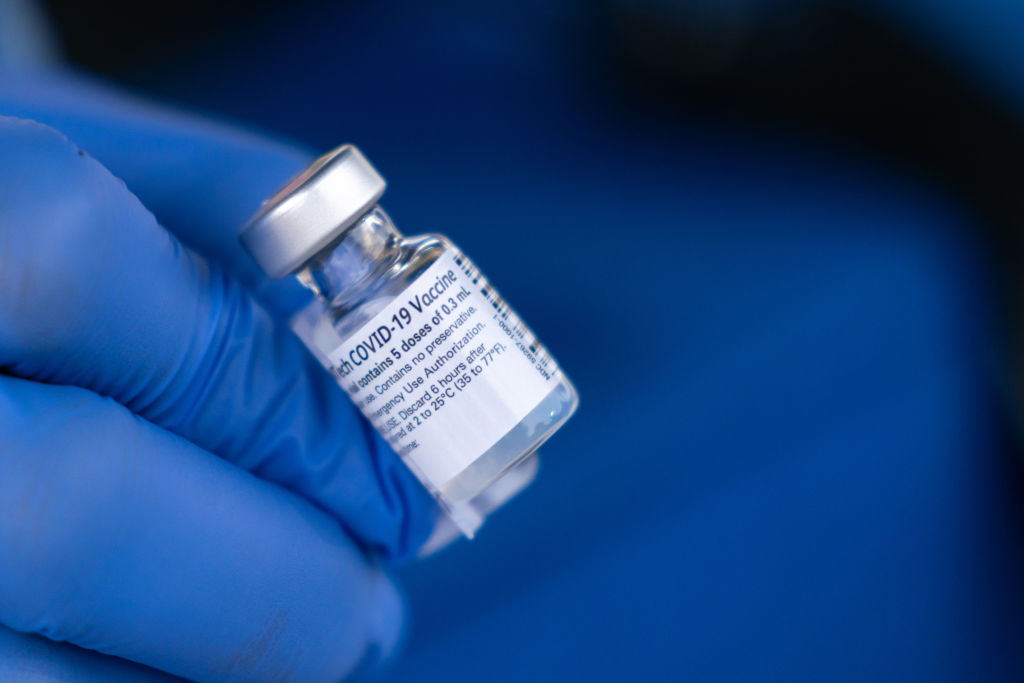Pfizer CEO expects COVID vaccine trials for kids to be completed in September


A free daily email with the biggest news stories of the day – and the best features from TheWeek.com
You are now subscribed
Your newsletter sign-up was successful
The Pfizer-BioNTech COVID-19 vaccine was fully approved on Monday by the Food and Drug Administration for people 16 and older, but it will still be some time before it's authorized for use in young children.
The Pfizer vaccine is available for kids between the ages of 12 and 15 under an emergency use authorization. Before emergency use authorization can be expanded to kids under 12 — which is expected this fall or winter, NBC News reports — clinical trials must be completed. Dr. Peter Marks, director of the FDA's Center for Biologics Evaluation and Research, told reporters on Monday the agency needs to have a "good safety dataset, because we certainly want to make sure we get it right in the children ages 5 through 11 and then even in younger children after that."
Pfizer and Moderna are both conducting vaccine trials in kids to determine the proper dosage and whether it is safe and effective for younger people. Pfizer CEO Albert Bourla told NBC News on Monday he expects studies on children ages 5 to 11 will finish in September, and the data will then get submitted to the FDA. Following adult vaccine trials, the FDA asks for two months worth of follow-up safety data, but for the children's trials, the FDA is requesting four to six months of data.
The Week
Escape your echo chamber. Get the facts behind the news, plus analysis from multiple perspectives.

Sign up for The Week's Free Newsletters
From our morning news briefing to a weekly Good News Newsletter, get the best of The Week delivered directly to your inbox.
From our morning news briefing to a weekly Good News Newsletter, get the best of The Week delivered directly to your inbox.
In the week ending last Thursday, there were 180,000 new cases of COVID-19 among kids and teenagers, the American Academy of Pediatrics said in a statement on Monday, and the organization is urging the FDA to "work aggressively to authorize a vaccine for ages 11 and younger."
A free daily email with the biggest news stories of the day – and the best features from TheWeek.com
Catherine Garcia has worked as a senior writer at The Week since 2014. Her writing and reporting have appeared in Entertainment Weekly, The New York Times, Wirecutter, NBC News and "The Book of Jezebel," among others. She's a graduate of the University of Redlands and the Columbia University Graduate School of Journalism.
-
 Political cartoons for February 16
Political cartoons for February 16Cartoons Monday’s political cartoons include President's Day, a valentine from the Epstein files, and more
-
 Regent Hong Kong: a tranquil haven with a prime waterfront spot
Regent Hong Kong: a tranquil haven with a prime waterfront spotThe Week Recommends The trendy hotel recently underwent an extensive two-year revamp
-
 The problem with diagnosing profound autism
The problem with diagnosing profound autismThe Explainer Experts are reconsidering the idea of autism as a spectrum, which could impact diagnoses and policy making for the condition
-
 Blue Origin launches Mars probes in NASA debut
Blue Origin launches Mars probes in NASA debutSpeed Read The New Glenn rocket is carrying small twin spacecraft toward Mars as part of NASA’s Escapade mission
-
 Dinosaurs were thriving before asteroid, study finds
Dinosaurs were thriving before asteroid, study findsSpeed Read The dinosaurs would not have gone extinct if not for the asteroid
-
 An introvert's dream? Flu camps that offer £4,400 to spend two weeks alone
An introvert's dream? Flu camps that offer £4,400 to spend two weeks aloneUnder The Radar A fortnight in isolation may not be as blissful as it sounds
-
 SpaceX breaks Starship losing streak in 10th test
SpaceX breaks Starship losing streak in 10th testspeed read The Starship rocket's test flight was largely successful, deploying eight dummy satellites during its hour in space
-
 Rabbits with 'horns' sighted across Colorado
Rabbits with 'horns' sighted across Coloradospeed read These creatures are infected with the 'mostly harmless' Shope papilloma virus
-
 Lithium shows promise in Alzheimer's study
Lithium shows promise in Alzheimer's studySpeed Read Potential new treatments could use small amounts of the common metal
-
 Scientists discover cause of massive sea star die-off
Scientists discover cause of massive sea star die-offSpeed Read A bacteria related to cholera has been found responsible for the deaths of more than 5 billion sea stars
-
 'Thriving' ecosystem found 30,000 feet undersea
'Thriving' ecosystem found 30,000 feet underseaSpeed Read Researchers discovered communities of creatures living in frigid, pitch-black waters under high pressure
